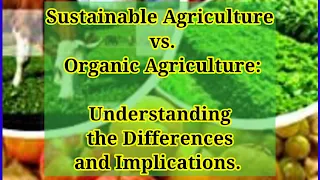Sustainable Agriculture vs. Organic Agriculture: Understanding the Differences and Implications.
Sustainable Agriculture vs. Organic Agriculture: Understanding the Differences and Implications.
Introduction
Agriculture plays a crucial role in sustaining human life and supporting economic development. As concerns about environmental degradation and health issues grow, alternative farming practices such as sustainable agriculture and organic agriculture have gained prominence. While both approaches prioritize ecological responsibility and reduced chemical inputs, they differ in their principles, certification criteria, and overall impact on the environment and society. This article aims to explore the key differences between sustainable agriculture and organic agriculture, highlighting their respective benefits and challenges.
Definition and Principles
Sustainable Agriculture:
Sustainable agriculture is a holistic approach to farming that seeks to maintain and improve the health of ecosystems while ensuring economic viability and social equity. It focuses on three core principles: environmental health, economic profitability, and social and economic equity. Sustainable farmers aim to minimize negative impacts on the environment, conserve natural resources, and promote biodiversity. Additionally, they consider the social well-being of farmworkers and local communities, emphasizing fair wages and community involvement.
Organic Agriculture:
Organic agriculture is a specific method of farming that eliminates the use of synthetic fertilizers, pesticides, genetically modified organisms (GMOs), and growth hormones. Instead, organic farmers rely on natural processes and resources to maintain soil fertility and manage pests. The principles of organic agriculture revolve around enhancing soil health, promoting biodiversity, and providing animals with natural living conditions. Organic certification ensures compliance with strict guidelines that prohibit the use of synthetic chemicals throughout the entire production process.
Focus on Chemical Usage
Sustainable Agriculture:
While sustainable agriculture also aims to reduce chemical inputs, it is not as rigid as organic agriculture in terms of certification criteria. Sustainable farmers prioritize the overall ecological health of their farms and may use some approved synthetic inputs as a last resort when other ecologically sound methods have failed. The emphasis is on minimizing harm to the environment while maintaining the long-term sustainability of the farm.
Organic Agriculture:
Organic agriculture strictly prohibits the use of synthetic chemicals. Organic farmers rely on natural alternatives such as compost, cover cropping, and beneficial insects to manage pests and maintain soil fertility. The organic certification process involves rigorous inspections to ensure compliance with these standards.
Scope of Practices
Sustainable Agriculture:
Sustainable agriculture encompasses a broader range of practices beyond crop cultivation. It includes agroforestry, integrated pest management, water conservation, renewable energy adoption, and wildlife habitat preservation. Sustainable farmers often take a whole-system approach, considering the interconnectedness of various components on their farms.
Organic Agriculture:
Organic agriculture primarily focuses on crop and livestock production. It emphasizes crop rotation, green manure, and natural pest control to maintain soil health. Livestock in organic farms are raised on organic feed and given access to outdoor areas.
Certification Process
Sustainable Agriculture:
Sustainable agriculture lacks a standardized certification process, making it challenging to compare the sustainability of different farms directly. However, various organizations provide voluntary sustainability certifications that adhere to specific criteria and principles.
Organic Agriculture:
Organic agriculture has well-established certification processes worldwide. Farms seeking organic certification must comply with strict guidelines and undergo regular inspections to maintain their organic status.
Conclusion
In conclusion, sustainable agriculture and organic agriculture share common goals of promoting ecological responsibility and reducing chemical inputs. However, they differ in their overarching principles, the scope of practices they encompass, and the strictness of their certification criteria. Sustainable agriculture takes a holistic approach, considering the economic, environmental, and social aspects of farming, while organic agriculture focuses specifically on eliminating synthetic chemicals. Both approaches have their strengths and challenges, and a combination of the two could pave the way for more regenerative and ecologically conscious farming practices in the future.
Friends, how did you like this article, you will definitely tell in the comment section and thank you for visiting our website continuously to get such articles.
Join my Teligram channel - Click here
Join my whatsapp group -Click here











Post a Comment